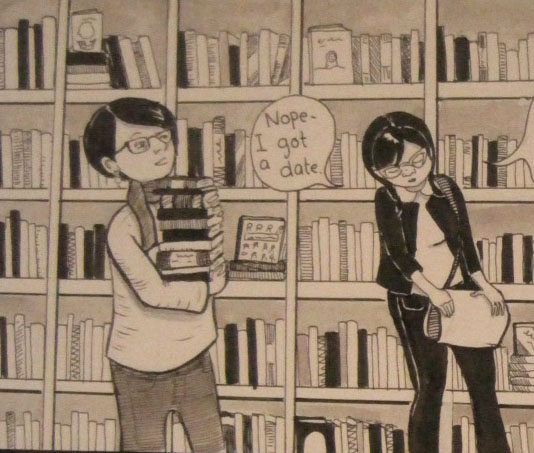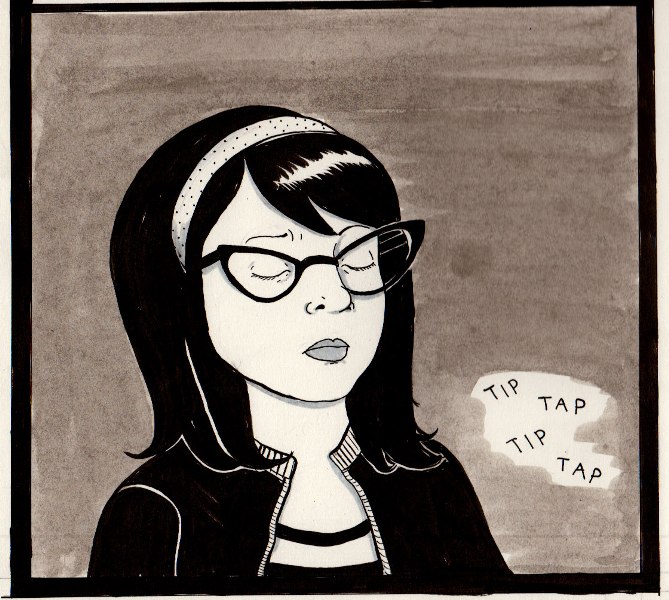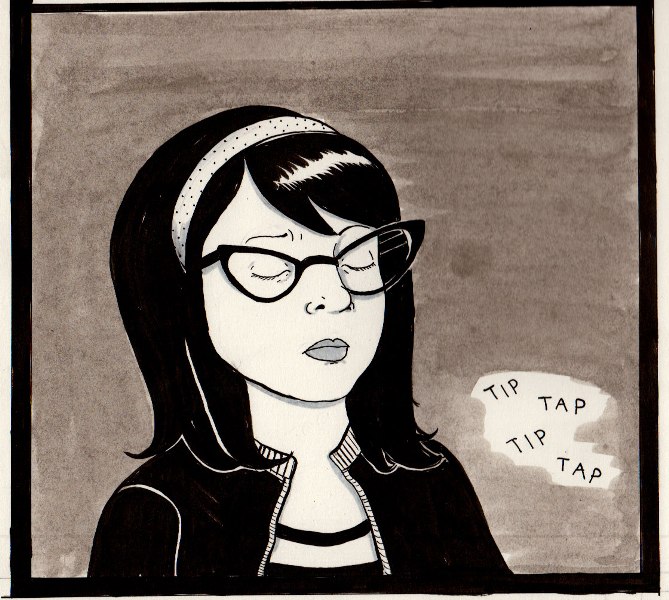Nicole J. Georges is a comic artist, zinester, teacher, and pet portrait artist living in Northern Portland. She is author of the zine “Invincible Summer,†co-founder of the Portland Zine Symposium, and has toured the country extensively with Sister Spit. Nicole’s first full-length graphic novel, Calling Doctor Laura, will be out in 2012 with Houghton Mifflin. She is also an instructor in the IPRC Comics Certificate Program.
Q. How do you describe what you do to people who don’t know what you do?
A. I am a teaching artist and I am finishing up a graphic novel-style memoir. I’ve been teaching with the IPRC since 2000, and currently teach through Writers In The Schools & Young Audiences. I do an autobiographical comic zine called “Invincible Summerâ€; I help do a zine called “Tell It Like It Tiz,†which documents the time I spend with senior citizens at the Marie Smith Center; I put out a yearly calendar; I just started a podcast called Sagittarian Matters; AND I do pet portraits and commissioned illustrations on the side.
I sell most of these things through my Etsy shop, Spinstersummer.
I plan to put out a “Bad Roommate†zine soon.
Q. You do so many different things — are you really three people? Seriously, how do you find the time?
A. I work all of the time. I have a witness. I just asked my partner for confirmation and she said: “You only work. You literally only work.†There aren’t enough hours in the day. I work on those things so much that I end up being bad at filling out forms and responding promptly to emails and correspondence. Also, I send my Etsy orders out in a week, which makes Etsy people CRAZY because they’re used to people who send things out the next day. Really rebelling over here.
Q. Can you talk about how (or whether) your different creative endeavors feed into the others?
A. “Invincible Summer†and my book (Calling Doctor Laura) are connected. I’ve always done zines, since I was fourteen, so “Invincible Summer†was a natural step for me. I’ve been doing it for sixteen years. I’ve tried to discuss what was going on in my life through the zine, but as time went on I became more cryptic. I had this crazy family story happening in my life as I was putting out the zine, but only hinted at it in the pages, only wrote veiled prose about it. The family story is what would become my full-length graphic memoir. I’ve used some pages from “Invincible Summer†in the book, only edited and in a more comprehensive context if that makes sense.
My calendar also came from “Invincible Summer,†and has since grown into its own thing, even though it retains the name. I think “Invincible Summer†fans sometimes purchase it, but it has crossed into a more crafty, art-collecting crowd.
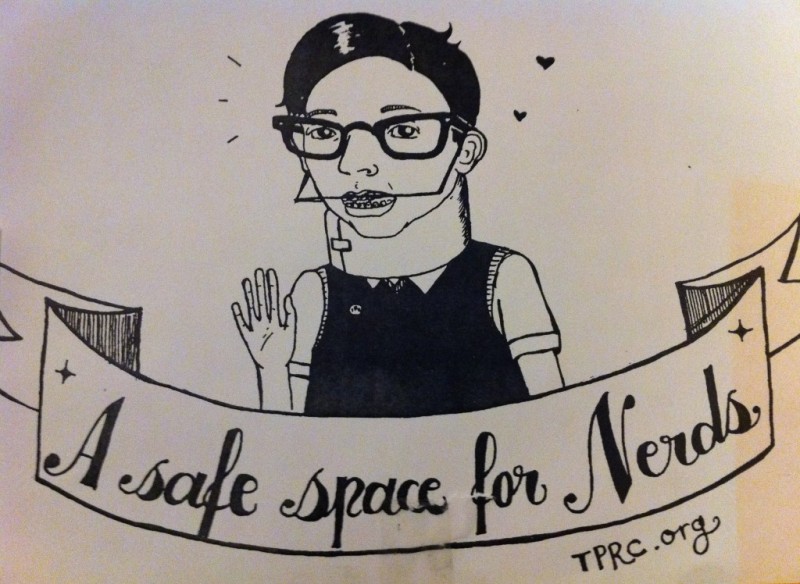
Q. How long have you been involved with the IPRC, and what types of things has it allowed you to do? Did it push you in any different creative directions?
A. I started volunteering at the IPRC in 2000, and was on staff as the Outreach Coordinator until 2007 or 2008. Working with Rebecca Gilbert at the IPRC helped me to get my teaching sea legs and to put words to the idea that zines offer empowerment through self-expression, and that I could work as a vehicle to get that message across to youth and adults. I have since taken that idea and run with it, expanding into teaching in the comics realm.
I’ve also met some great friends at the IPRC who’ve changed my life. I met my longtime collaborator and friend Greg Means, with whom I do a yearly split comic. Greg was the librarian when I started volunteering at the IPRC. We started drawing comics together and eventually he published the first “Invincible Summer†anthology book for me (which was so excellently kind of him), which helped launch me across the U.S. on a book tour.
I started working with the Rock ‘n’ Roll Camp for Girls after they solicited the IPRC for zine workshops. I’ve been working with them for about ten years.
I started working with the senior citizens at the Marie Smith Center after they solicited the IPRC for a zine workshop, and our workshop there has been happening every Friday for five years. It didn’t matter that I wasn’t working at the IPRC anymore after a time, I just really enjoyed the company of the senior citizens and we grew to be family, so I couldn’t stop going.
Q. Can you share some of your thoughts about self-publishing and why you publish your own work, and also if/why it’s important for people to be able to self-publish?
A. I firmly believe that self-publishing = empowerment. There is no reason for someone to wait around for someone else to publish them. There is no reason for someone to wait around, imagining that they are less of a writer or artist, or not a “Real†writer or artist until they get the validation of a publisher. That is hogwash! You can publish yourself! Walk over to the copy machine, press the button, staple it up, you’re done. You’re a published writer. It’s fine.
The zines I read in high school changed my life. They changed my outlook on mental health, on trauma, on animal rights, on racism, fat positivity, gender, sexuality, and politics. All of those things, just from zines. The people who were writing those zines were close to my age. They wrote in ways that were conversational and raw; they pasted up their ideas in a very punk, cut-and-paste way.
There is No Way that someone else would’ve published 90 percent of the writing that changed my life. It was too raw, it was too choppy and mixed autobiography with politics. No way! If those people hadn’t been part of zine culture, hadn’t photocopied and distributed themselves, their ideas would never have reached me in suburban Kansas. Self-publishing really does make a difference.
Look at the Riot Grrl movement. It was fueled by zine culture; the message came through, unfiltered, via zine. Riot Grrl is over in its initial incarnation, but it’s still relevant. Does anyone really think that women in music are accurately portrayed and covered in the media? Who is writing about girls in punk bands, or girls who are mannish or weirdos who do not fit in with beauty standards? There is still a place for zine culture, for a different voice to come forward and cover the underground stories, music, and ideas of our culture.
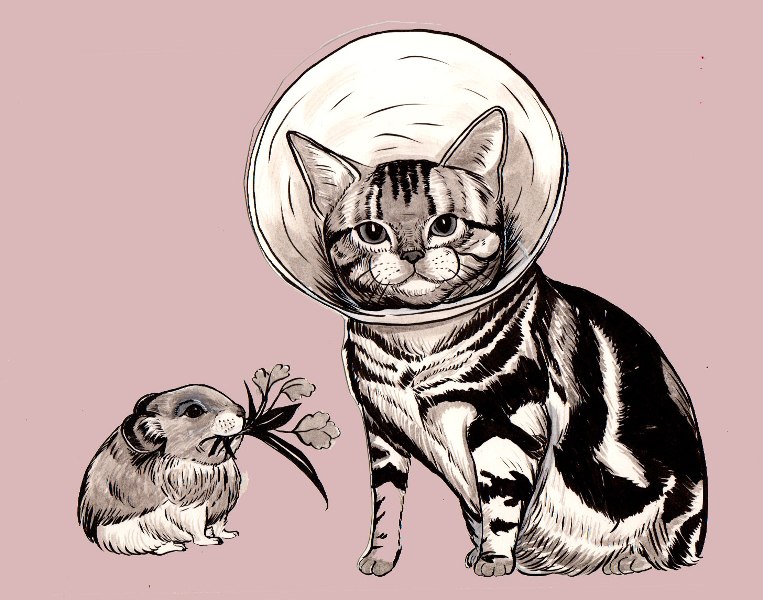
Q. What do you like about teaching in the Comics Certificate program?
A. It is such a JOY to teach at the Comics Certificate program. SERIOUSLY! I teach children and rowdy high school students during the day, and there’s never enough time to tell them everything I’d like to. The Comics Certificate Program offers me lots and lots of time (three-hour long classes, three semesters) to spend with students and to examine almost every angle of comics that I’d like. It is also stocked with eager learners who have chosen to be there and are coming to the program with an extensive knowledge of comics. I would make classes four hours long if I could.
Q. What do you think students can get out of the program?
A. First and foremost, I think students are learning things that we all had to figure out the hard way. Any mistakes or lessons I’ve come to on my own, drawings I’ve had to scrap, aha lightbulb-over-the-head caveman moments, I get to verbalize those for students.
Secondly — I think students will find a great community by being a part of the program, both in their class and through meeting program alumni, mentors, and staff. We offer them every opportunity to fully entrench themselves in Portland comics culture.
Thirdly — Unlike a university, when students graduate our program, they are still welcome in the space. They can still use the tools they’ve learned about at the center to create and publish their work.
And fourthly– I’ve heard from former students that it was valuable to have their work critiqued by fellow students and to see how people actually READ their comics. The science of how to tell a story in a way that is understandable for a reader. It’s easy to lose sight of that when you are working on your own. You assume that people will magically understand your artistic vision, but without a thorough examination of comic language and rhythm, you might lose something.
Q. Anything else you’d like to add about the IPRC, your work, or your general thoughts on life?
A. I have a new calendar coming out that you should buy.
I think artists should get paid for their work like anybody else.
I love teaching at the IPRC.
And I wish there were more hours in the day.
(Nicole was interviewed by Amy Souza, a student in the Comics Certificate Program.)
